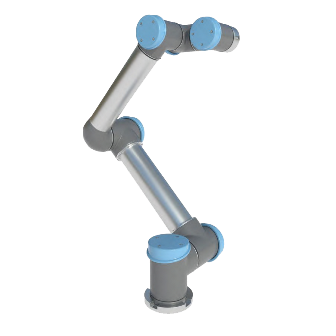Industry 4.0 is a term used to refer to the next phase in manufacturing which is the digitalization of the production of goods. Automated equipment is playing a key role in the development of Industry 4.0 as the main goal is to eliminate or significantly reduce human involvement in manufacturing. This is achieved by automating production processes with robots and other automated machines and connecting them to a central communication system, the Internet of Things (IoT). When industrial robots and machines are connected to the IoT a smart factory is developed allowing for Industry 4.0.
While there are many benefits of Industry 4.0 and a completely automated factory, there have been some limitations to the concept. However, collaborative robots are proving to be key in overcoming these limitations and are helping to expand the application of this new manufacturing concept.
Cobots standout from industrial robots since they are designed for collaborative work with humans. Their enhanced sensors, rounded edges, and small size make them safe to operate alongside workers without any safety barriers. FANUC’s CR-15ia features a soft exterior for extra collision protection. Since cobots are mainly designed for collaborative operation they can automate tasks that were not suitable for automation in the past with traditional industrial robots. Cobots can be applied to settings or for tasks that traditional industrial robots could not, overcoming the limitation of Industry 4.0 in which industrial robots are not suitable for all manufacturing processes. They are also more compact allowing them to operate in narrow spaces in which industrial robots may not fit. Cobots are also more user-friendly, especially with programming. The Universal UR10 can be programmed through hand guidance, as well as most other cobots. Cobots are a good robotic automation solution for older factories or those in developing countries that otherwise could not afford to build a fully automated factory.
Collaborative robots allow manufacturers to keep control of their own automated processes. Cobots are managed locally in the factory as they are programmed, integrated, and monitored in-house. This overcomes the limitation of Industry 4.0 in which manufacturers are unable to control their production processes since the design and management of automated equipment is typically outsourced. For those needing more flexibility, implementing cobots can allow for this since companies can control their own manufacturing processes.
Cobots may seem counterintuitive to Industry 4.0 since they are mainly designed to operate collaboratively with workers while the end goal of Industry 4.0 is lights-out manufacturing. However complete lights-out manufacturing may not be realistic for all companies. Cobots allow for the automation of unique processes to improve production efficiency. Many cobots are designed with powerful computers that allow them to easily connect to the internet of things and communicate with factory equipment, one of the main principles of Industry 4.0. Cobots like the Universal UR5, are assisting workers with robotic applications that could not previously be automated, helping to expand the practice of Industry 4.0. They are widening the initial vision of the concept, making it more applicable to all types of manufacturers.
Robots Done Right |
Used Robot Sales |
Cobots for Industry 4.0

Robots Done Right is the place to start when it comes to used robots. Contact us if you are interested in buying or selling your used robot.